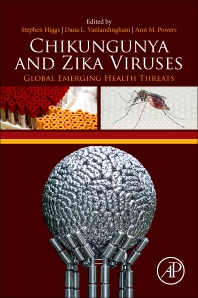June 13, 2018
K-State researchers co-edit new book, 'Chikungunya and Zika Viruses: Global Emerging Health Threats'

Chikungunya and Zika have seized headlines around the world. A book released this week by Elsevier's Academic Press provides both historical and current information on these important viruses.
Stephen Higgs, director of the Kansas State University Biosecurity Research Institute and university distinguished professor of diagnostic medicine and pathobiology, in the College of Veterinary Medicine, and Dana Vanlandingham, associate professor of diagnostic medicine and pathobiology, served as editors. Ann Powers, chief of the Alphavirus Laboratory for the Centers for Disease Control and Prevention Arboviral Disease Branch in Fort Collins, Colorado, was the third co-editor. All three editors also wrote chapters for the 398-page book. Yan-Jang S. Huang, research assistant professor of diagnostic medicine and pathobiology, was the lead author of a chapter with Higgs and Vanlandingham as co-authors.
The two viruses are both spread by particular species of mosquitoes and share origins in Africa and Asia, and both have caused epidemics in the Americas. The need for tools to diagnose these viruses and vaccines to prevent disease has spurred international interest and funding opportunities for research.
"This book represents a two-year effort to gather up-to-date information in a single source. Experts around the world contributed chapters on topics including history and misdiagnosis of the viruses, how the viruses have mutated, animal models for pathogenesis studies, the status of current diagnostic platforms and vaccine development and more," Higgs said.
Chikungunya virus causes severe crippling arthritis that lasts for months or years, and Zika has been associated with birth defects in children of women infected during pregnancy.
"Our understanding of these emerging viruses has improved over the last five years, but having a comprehensive single source of information that details what we know and identifies areas of further examination is an important step in fighting them," Vanlandingham said.
